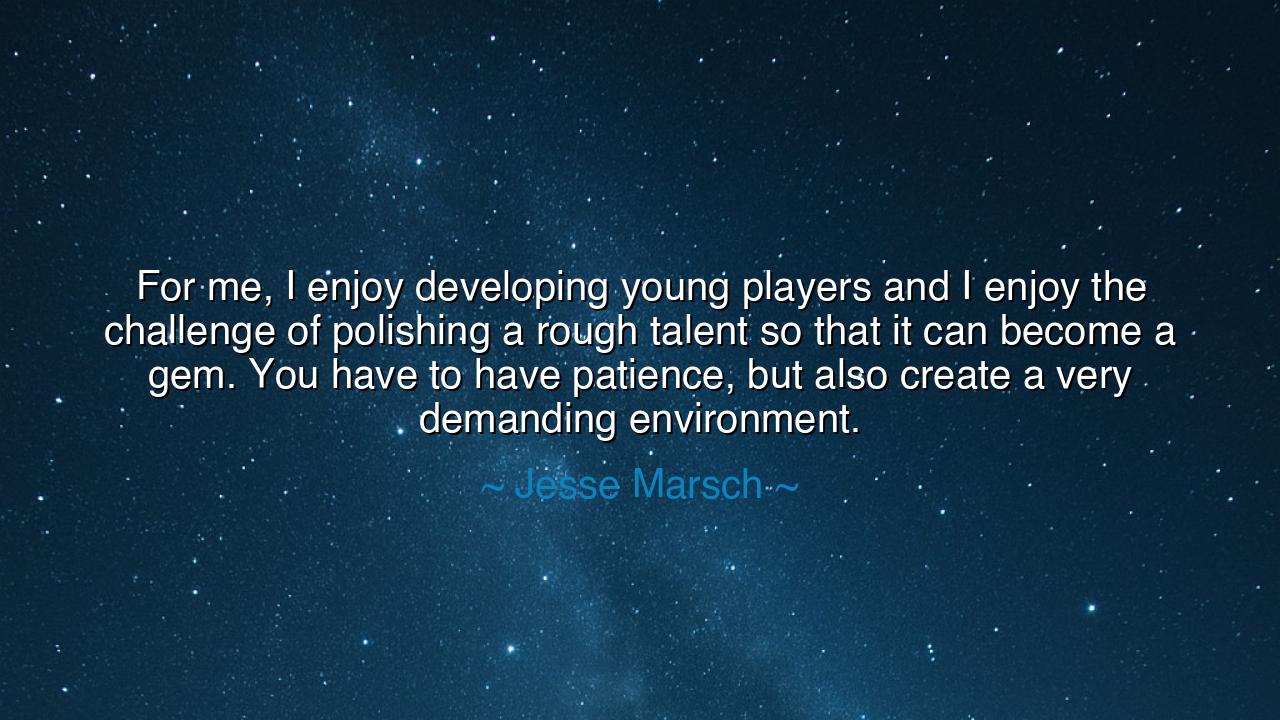
For me, I enjoy developing young players and I enjoy the
For me, I enjoy developing young players and I enjoy the challenge of polishing a rough talent so that it can become a gem. You have to have patience, but also create a very demanding environment.






Hear the words of Jesse Marsch, who has walked the fields of sport as both warrior and teacher: “For me, I enjoy developing young players and I enjoy the challenge of polishing a rough talent so that it can become a gem. You have to have patience, but also create a very demanding environment.” In these words we find not only the wisdom of a coach, but the ancient truth of all who shape others into greatness—that the master’s joy lies not merely in victory, but in transformation.
He speaks of developing young players, and in this we hear the echo of the mentor guiding the apprentice, the elder teaching the youth. To see raw potential and to imagine what it may one day become—this is a divine gift. For the unformed soul, like uncut stone, contains beauty hidden within, waiting for the guiding hand to reveal it. Marsch reminds us that the task of the teacher is not to impose greatness, but to draw it out, to refine what already lies within.
He calls this work the challenge of polishing a rough talent. Just as the jeweler takes a dull stone and, with patient hands, shapes it into a radiant jewel, so too must the mentor take raw skill and refine it into mastery. This is no easy labor—it is long, demanding, often frustrating. Yet it is in this process of polishing that both teacher and student are tested. The stone must endure the grinding wheel, and the teacher must endure the slow progress, the mistakes, the resistance. Without patience, the gem is left unfinished; without discipline, it is left dull.
But Marsch is clear: patience alone is not enough. He reminds us that the young cannot grow in softness alone—they must be forged in a demanding environment. For comfort does not sharpen; only pressure, only fire, only the test of limits brings out brilliance. History offers us proof in the training of the Spartan youth, who were hardened through discipline so that they might one day stand unbroken in battle. Or in the story of Michelangelo, whose apprentices learned under his relentless eye, enduring his high demands, until they too could breathe life into marble. Greatness comes not from ease, but from challenge.
This duality—patience and demand—is the heart of true mentorship. Too much patience without expectation breeds weakness. Too much demand without patience breeds despair. The master must walk between these poles, as a tightrope walker balancing over the abyss. To guide another is to know when to hold back and when to push, when to comfort and when to challenge. The one who learns this balance shapes not only skill, but character.
Consider the example of Sir Alex Ferguson, the legendary manager of Manchester United. He took young players—David Beckham, Ryan Giggs, Paul Scholes—mere youths with raw ability—and under his hand they became legends. He demanded discipline, focus, and sacrifice, yet also shielded them with patience as they grew. By polishing their rough edges and demanding their best, he forged a generation of champions. This is the living proof of Marsch’s words, where guidance and pressure together created brilliance.
The lesson is clear: whether in sport, art, or life, greatness is not born complete. It must be developed, polished, and tested. To the teacher: take joy not only in the finished gem, but in the long process of shaping it. To the student: endure the pressure, for it is the very force that reveals your brilliance. And to all: balance patience with demand, gentleness with discipline, for only in this harmony can raw talent become enduring greatness.
Practical actions stand before you. If you guide others, create environments where they are both supported and challenged. If you are guided, accept correction with humility and trust the process of refinement. Seek out mentors who both believe in you and demand your best. And above all, remember that within every “rough stone” lies a gem, waiting to shine—if only patience and pressure are given their rightful place.






AAdministratorAdministrator
Welcome, honored guests. Please leave a comment, we will respond soon